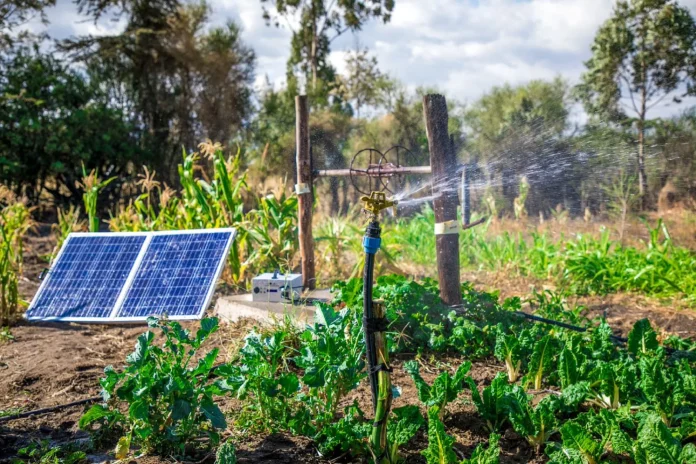A one acre vegetable garden powered by solar energy is quietly rewriting the economic playbook for farmers in Lijobilgu, a rural community in Ghana’s Mion District where subsistence agriculture has long been the only game in town.
The garden, established by CARE International with support from The Church of Jesus Christ of Latter-Day Saints, isn’t just about growing vegetables. It’s about transforming farmers into business operators who understand production cycles, market demand, and profit margins. That’s a significant shift in communities where agriculture has traditionally meant growing enough to eat, with maybe a small surplus to sell if the rains cooperate.
Madam Agnes Loriba, CARE International’s Northern Regional Team Leader, frames it simply during the official handover at a Farmer Field and Business School event. The garden is a business classroom where women and youth learn to manage production, adopt new technologies, and generate income while improving nutrition. It’s farming meets entrepreneurship, backed by the kind of infrastructure that makes year round cultivation possible.
That infrastructure matters. Solar powered irrigation means farmers can grow okro, pepper, and tomatoes even during dry seasons when most rural gardens sit idle. Continuous cultivation translates to steady income streams, which changes the economics of rural life in fundamental ways. Farmers can repay loans on time, pay school fees when due, and reinvest in seeds and fertilizers without waiting for the next harvest to bring cash.
The project operates under two programs with impressive acronyms: Affordable Agricultural Financing for Resilient Rural Development (AAFORD) and Fill the Nutrition Gap (FNGAP). They’re jointly funded by Ghana’s Ministry of Finance and the International Fund for Agricultural Development, targeting 50,000 farmers across six regions with a split focus: 40,000 in agriculture, 10,000 in nutrition. Gender equality and climate resilience are central to the design.
For Lijobilgu residents, the practical impact shows up in daily life. Madam Lilo Novasang Benedicta, who chairs the CARE Ghana Nutrition Group locally and works as a trader, remembers when vegetables meant expensive purchases from external markets. Now the community grows and sells its own produce, creating economic opportunities particularly for women who previously depended on unpredictable income sources.
Mr. Uwumbordo Wassak Godwin, another farmer, connects improved agricultural training directly to community health outcomes. Before the project, children and pregnant women suffered malnutrition. Better farming techniques have meant better eating, better earning, and improved living conditions. It’s the kind of straightforward causality that development projects often promise but don’t always deliver.
The economic effects are rippling beyond Lijobilgu into nearby communities like Nyorigu and Zantani. When farmers have consistent yields, they become reliable economic actors capable of meeting financial obligations and making investments. That reliability matters for building functional rural economies where credit, planning, and growth become possible rather than perpetually deferred dreams.
Mr. Fuseini Karim, Deputy Coordinating Director of the Mion District Assembly, describes the garden as economic transformation, not just food production. That’s the right framing. Ghana has plenty of agricultural projects focused on increasing yields. What’s different here is the explicit emphasis on business principles, market linkages, and entrepreneurial skills alongside production techniques.
Whether this model scales successfully remains to be seen. One acre gardens in pilot communities are one thing. Replicating the approach across thousands of communities with varying infrastructure, market access, and social dynamics is considerably more complex. Solar irrigation requires maintenance, business training needs ongoing support, and market linkages can collapse if supply chains falter or prices crash.
There’s also the sustainability question. Development projects often succeed during implementation phases when external funding, technical support, and attention are abundant. The real test comes after the handover ceremony when communities must maintain infrastructure, continue training, and sustain business practices without the same level of external input. Mr. Karim’s urging that community members ensure long term sustainability suggests officials understand this challenge.
What’s encouraging is the focus on blending modern farming techniques with traditional knowledge to build what the project calls rural agripreneurs. That terminology might sound like development speak, but it captures something important: the goal isn’t just to make farmers more productive, but to help them think like entrepreneurs who can drive local economic growth.
For communities like Lijobilgu, where economic options have historically been limited and poverty has been persistent, the shift from subsistence to sustainability represents meaningful progress. Whether it’s replicable, sustainable, and transformative at scale will depend on factors beyond this single garden’s success, but the model offers a template worth watching.
Agriculture becomes a viable business when farmers have reliable infrastructure, relevant skills, and functional market connections. CARE International’s solar powered garden provides all three. Now comes the harder part: proving the model works not just in one community, but across the diverse landscape of rural Ghana where development projects have promised transformation before.
Source: newsghana.com.gh











